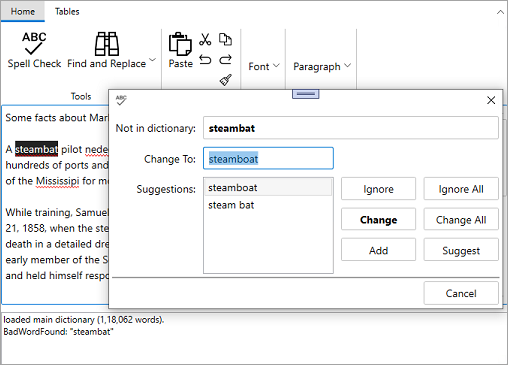- WPF RichTextBox Overview
- WPF RichTextBox Key Features
- WPF RichTextBox Quick Start
- XAML Quick Reference
- Working with WPF RichTextBox
- Working with the C1Document Object
- Working with C1RichTextBoxToolbar
- Working with C1SimplifiedRichTextBoxToolbar
- Working with RichTextBox Ribbon
- Working with RichTextBox ToolStrip
- Elements Supported in RichTextBox
- C1RichTextBox Appearance
- Spell-Checking
- Template Customization
- C1RichTextBox Samples
- C1RichTextBox Task-Based Help
Spell-Checking
Most rich editors implement two types of spell-checking:
- Modal spell checking: Shows the Spelling dialog box and selects each spelling mistake in the document. The user may choose to ignore the mistake, fix it by typing or picking from a list of suggestions, or add the word to a user dictionary.
- As-you-type checking: Highlights spelling mistakes as the user types, typically with a wavy red underline. The user may right-click the mistake in the document to see a menu with options that include ignore, add to dictionary, or pick a suggestion to correct the mistake automatically.
RichTextBox supports both types of spell-checking using the C1SpellChecker component, included in WPF Edition. Please note that the C1SpellChecker ships as a separate assembly altogether because it can be used with various other controls for spell-checking.
Modal Spell Checking
To implement modal spell checking, you need to add a reference to the C1.WPF.SpellChecker assembly to your project. Then, add the following code to your project. This code creates a new C1SpellChecker object to be shared by all controls on the page that require spell-checking. Later, the page constructor invokes the Load method to load the main spelling dictionary from a stream containing the compressed Dictionary data. C1SpellChecker includes over 20 other dictionaries which can be downloaded from our site. In this case, we are loading C1Spell_en-US.dct, the American English dictionary. This file must be present on the application folder. When the modal checking is complete, the _c1SpellChecker_CheckControlCompleted event fires and shows a dialog box to indicate that the spell-checking operation is complete.

public partial class SpellCheckerRichTextBoxDemo : UserControl
{
// declare the C1SpellChecker
C1SpellChecker _c1SpellChecker = new C1SpellChecker();
public SpellCheckerRichTextBoxDemo()
{
InitializeComponent();
this.Tag = Properties.Resources.SpellCheckerRtbDemoDescription;
Loaded += Page_Loaded;
Unloaded += Page_Unloaded;
}
void Page_Loaded(object sender, RoutedEventArgs e)
{
// connect toolbar to C1RichTextBox
_rtbToolbar.RichTextBox = _richTextBox;
_richTextBox.SpellChecker = _c1SpellChecker;
// load sample text into text boxes
using (var stream = Assembly.GetExecutingAssembly().GetManifestResourceStream("SpellCheckerExplorer.Resources.test.txt"))
using (var sr = new StreamReader(stream))
{
var text = sr.ReadToEnd();
_richTextBox.Text = text;
}
// set up ignore list
WordList il = _c1SpellChecker.IgnoreList;
il.Add("ComponentOne");
il.Add("Silverlight");
// monitor events
_c1SpellChecker.BadWordFound += _c1SpellChecker_BadWordFound;
_c1SpellChecker.CheckControlCompleted += _c1SpellChecker_CheckControlCompleted;
// load main dictionary
if (_c1SpellChecker.MainDictionary.State != DictionaryState.Loaded)
_c1SpellChecker.MainDictionary.Load(Application.GetResourceStream(new Uri("/" + new AssemblyName(Assembly.GetExecutingAssembly().FullName).Name + ";component/Resources/C1Spell_en-US.dct", UriKind.Relative)).Stream);
if (_c1SpellChecker.MainDictionary.State == DictionaryState.Loaded)
{
WriteLine("loaded main dictionary ({0:n0} words).", _c1SpellChecker.MainDictionary.WordCount);
}
else
{
WriteLine("failed to load dictionary: {0}", _c1SpellChecker.MainDictionary.State);
}
// save user dictionary when app exits
App.Current.Exit += App_Exit;
}
void Page_Unloaded(object sender, RoutedEventArgs e)
{
_c1SpellChecker.BadWordFound -= _c1SpellChecker_BadWordFound;
_c1SpellChecker.CheckControlCompleted -= _c1SpellChecker_CheckControlCompleted;
}
// monitor spell-checker events
void _c1SpellChecker_CheckControlCompleted(object sender, CheckControlCompletedEventArgs e)
{
if (!e.Cancelled)
{
var msg = string.Format("Spell-check complete, {0} errors found.", e.ErrorCount);
MessageBox.Show(msg, "Spelling");
}
WriteLine("CheckControlCompleted: {0} errors found", e.ErrorCount);
if (e.Cancelled)
{
WriteLine("\t(cancelled...)");
}
}
void _c1SpellChecker_BadWordFound(object sender, BadWordEventArgs e)
{
WriteLine("BadWordFound: \"{0}\" {1}", e.BadWord.Text, e.BadWord.Duplicate ? "(duplicate)" : string.Empty);
}
}


